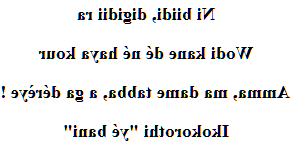Songhay love poem
Dígí
Ni biidi, digidii ra
Wodi kane dé né haya kour
Amma, ma dame tabba, a ga dérèye !
Ikokorothi “yé bani”


→ French poem ←
Songhay language
Songhay love poem with charms of West Africa here of Mali, reflection of a smiling face and two piercing eyes. The poem is in Songhaï (Songhay, Sonrhaï, Ayneha), a Nilo-Saharan language, constituting a particular branch, spoken by 3 million people. There are several songhai dialects.
According to Greenberg's classification, Songhaï is one of the six branches of the Nihilo-Saharian phylum. If this language is spoken by Touragegs, it is not affiliated with Berber languages. If this language, with its different dialects, covers a fairly wide geographical area, it is because of the history of the empire of the same name.
The 3 main dialects of Songhay language are: west, east and center. It is that of Gao (east) which defines the standard of this language in Mali. Zarma and Dendi in Niger, Nigeria, Benin are neighbors, but considered as independent languages. The Songhai empire from the 9th century to the middle ages, will spread its language and will be in contact with other languages (Mande, Kwa, Gur, Berber) that will influence its different dialects, to the point of making them diverge.
The Songhais
The Songhais people are a people of mixed ethnicities, Peuls, Touaregs, Malinkes etc. They formed a radiant empire in the 15th century. The Mali ancient French Sudan is a multi ethnic country, the songhai language not the most spoken!
The Songhai Empire is a Sudanese empire linked to the Sahelian part of the loop of the Niger Valley. Born of Sorkos fishermen and Gows hunters who recognized the authority of Faran Maka Boté, its first capital is Koukya. In the 8th century, appears the Dia dynasty that transports the capital to Gao.
The Sonni dynasty appears around 1275 following the expansion of Mali and the conquest of Songhai. Ali Kolon creates a new dynasty based in Koukya. When the hold of Mali ceases with the reign of Sonni Ali Ber, truly born the Songhai empire. The empire will gradually disappear in the 18th century.